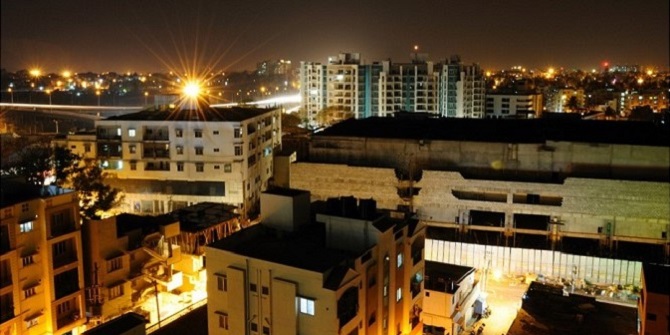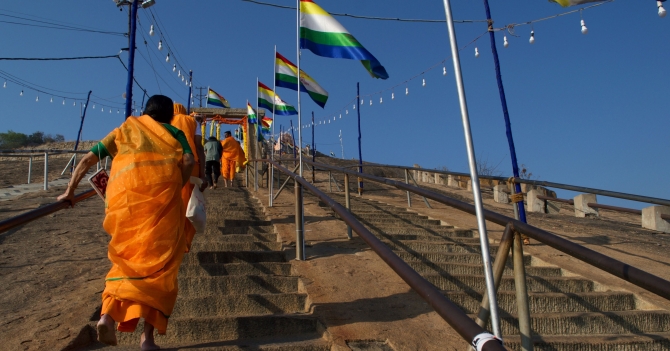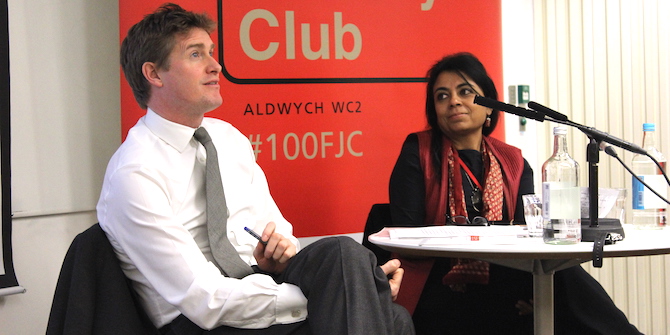In March, Swetha Rao Dhananka visited LSE to discuss her doctoral research on social mobilisation in pursuance of housing rights for the poor. She considered the citizens’ rights created by the Indian post-colonial legal and policy framework and examined the strategies of differently-resourced civil society organisations in addressing housing issues. Sonali Campion offers an overview of the presentation.
Bangalore, India’s third largest city, is home to almost nine million people. Arriving in the tech capital you drive along well-maintained metalled highways, bordered by extensive street lighting and well-kept greenery. Giant billboards advertise luxury apartments targeting the growing middle class with slogans like “The 1% Club – are you the one?”

Yet behind this glittering cityscape showcasing wealth and aspiration, around two million people live in crumbling social housing or slums. These are the lower caste subjects of India’s housing crisis, where more than half of all Scheduled Caste households occupy barely habitable homes. This is despite the multiple urban poverty alleviation schemes since the late 1950s.
Why hasn’t a mass housing movement occurred in the city of Bangalore? After all, India has a rich history of mobilisation. What if the two million people living in Bangalore without adequate housing flooded the streets to claim housing from the state? These were the questions that Dr Swetha Rao Dhananka pursued during her PhD (completed in 2013), and which she discussed at a South Asia Centre talk at LSE in March. More specifically, she asked how do differently resourced civil society organisations mobilise in pursuance of adequate housing in Bangalore? As well as considering why political opportunities might differ, she emphasised how “informal exchange circuits” (opportunities for corruption and clientelism) significantly hindered mobilisation.
The theoretical framework developed to address these questions includes three linkages: Macro-meso, formal-informal and system of discourses-organisational framing. In this way political opportunities could be understood in relation to claiming tactics and formal-informal interactions. The study of legal and policy documents informed the openness of political opportunities and prevalent incentives for informal practices. Data were gathered through interviews with civil society organisations, government officials and affected slum communities.
BSUP and the limitations in housing policy provisions
The research focussed on the application of the Basic Services to the Urban Poor (BSUP) component of the Jawaharlal Nehru National Urban Renewal Mission (JNNURM), which ran from 2005/6-2012. The mission provided central financial assistance to fast-track planned development, promote more efficient delivery of infrastructure and encourage greater community participation. BSUP specifically promised to construct social housing for the urban poor. In Bangalore 54 declared slums were earmarked for development.
Dr Rao Dhananka found that there were significant limitations in the BSUP policy and guidelines despite the “good governance” rhetoric. The most pressing issue for the slum-dwellers was the omission of transit housing for in-situ redevelopment, which worsened their condition substantially. The exclusive eligibility criteria had an adverse effect on the community constituted by the shared space. There was a lack of accountability on many fronts: No qualitative appraisal of projects, no
participatory exercises with the community despite policy prescription and finally the incidents of corruption found in the case studies related to loopholes found in the policy and guidelines.
Case studies: The NGO vs. the slumdwellers pressure group
In her presentation, Dr Rao Dhananka focussed on two of the four social movement organisations engaged in housing that she had looked at for her PhD: An internationally-funded local NGO and a slumdwellers organisation (SDO). She narrated selected episodes to offer insights into contrasting approaches to mobilisation, outcomes and long-term impact.
NGO
The NGO under scrutiny was a well-resourced and established organisation in Bangalore. They became involved with a small slum located by a junction in North Bangalore. The residents had been told by the contractor recruited to build the BSUP social housing that they had to move out so the redevelopment could take place, but were reluctant to vacate their homes without more assurances. The NGO worked to inform the community about the project, and organised a grievance redressal meeting with the Slum Development Board.
The issue of transit housing was a key point of contention: when the development began, there was nowhere for the community to go, so two-thirds of the community simply shifted to the pavement. During the monsoon, the conditions became dire, and the NGO called on the Information Commission Officer to pressure the Slum Development Board to provide transit housing. However, the board ducked responsibility, on the basis that there was no budget for it.
Nine months later, one out of the three planned buildings had been completed. Despite the fact there was no water or electricity, all those who had been living on the pavements moved in, resulting in threefold occupancy. The allocated funds were diverted elsewhere before they reached the project, so work ceased on the other buildings. The community was therefore left living in cramped conditions, waiting for utilities and the rest of the development to be completed.
Slumdweller’s organisation
This SDO was a young organisation which evolved from a slumdwellers’ youth group. They picked up on a case of a community of load-bearers, living in a slum located by a drain and surrounded by electrical pylons. The slum burnt down as a result of a fallen electricity pole and a woman was killed, sparking outrage. With the SDO’s support the residents protested and blocked the road with the corpse. The bureaucrats responded quickly, offering compensation and encouraging the community to sue the electrical board, but the SDO stressed to the community “no, this should be a state issue, we are citizens”. They facilitated discussion of caste rights within the community and raised awareness of the unacceptable living conditions.
The community then took their dispute to the District Commissioner’s office, arriving with pots and pans to stage a sit-in. As a result, they were allotted land in the north of the city. Unfortunately, the resettlement proposal met with resistance: Goondas turned up with weapons to protest the new arrivals, it was felt that slumdwellers would drag down the escalating real estate prices in the area. Fearing a breakdown in law and order, the Commissioner made a U-turn and offered a different piece of land but the community met with the same hostile reception. Out of sheer frustration they
blocked the national highway for four days, demanding a proper solution, and as a result they were one of the few communities to be moved into the new housing built under the BSUP scheme.
These two cases exemplified contrasting strategies for helping vulnerable communities. The NGO was more moderate, employing Right to Information requests, mediating with powerbrokers and offering advice to the community but, at the same time, keeping a certain distance to the community. The organisation operated within predominantly middle class NGO networks and sought to build replicable strategies that increased accountability. SDOs on the other hand were more radical and their tactics inspired fierce threats, while their primary aim was to ensure that the basic human needs of the community were addressed. Their networks centred on the slumdwellers and they resisted NGO interference, but their methods were arguably more sustainable in that they helped the slumdwellers to develop their own skills in pursuance of their rights.
Why hasn’t there been sustained mass mobilisation on housing?
The communities’ ability to build a consistent and cohesive movement was undermined by the divisive eligibility criteria (linking to a wider debate about the politics of proof in systems of governmentality). Furthermore, they were often physically scattered during redevelopment or relocation, and as communities were moved around, their interlocutors and targets were constantly changing.
There were also multiple incentives for corruption, created by the loopholes in legal and policy frameworks, which disrupted mobilisation efforts. For example, clientelism led to exclusive vertical networks of patronage, which demobilises the horizontal ties which are more conducive to organising. She also highlighted how efforts by the urban poor to mobilise and challenge the power structures were often supressed by informal repression (such as the Goondas threatening relocated slumdwellers).
So although the formal political opportunities to pursue claims to adequate housing were theoretically open, the reality was very different. Dr Rao Dhananka’s cases show that – depending on available information and understanding of the workings of government and bureaucracy – the opportunities had to be “cracked open”. Due to their higher literacy levels, the better resourced were more able to access the legal arsenal, where the SDO used confrontational tactics more.
On a more conceptual level, the rich qualitative research revealed that social skill resources and transforming caste identity into the one of a citizen were key to achieving effective mobilisation and accessing housing. This study adds weight to previous findings that informal dimensions should be considered from the outset when designing policy, as this is more likely to lead to successful project implementation. She also indicated that her study highlighted the problems of linking benefits to individuals on the basis of caste and social status. She suggested housing deficiencies could be better addressed if policies recognised the communities as moulded by shared space, rather than identity alone.
Note: This article gives the views of the author, and not the position of the South Asia @ LSE blog, nor of the London School of Economics. Please read our comments policy before posting.
About the Author
Swetha Rao Dhananka is currently a post-doc fellow sponsored by the Swiss National Science Foundation and hosted by UCL’s Development Planning Unit and the Indian Institute for Human Settlements in Bangalore, India. She received the faculty prize from the University of Lausanne (Switzerland) for her doctoral research and is preparing a book manuscript on its basis.
Sonali Campion is Editor of the South Asia @ LSE blog.








Unless we close down the present Society with selfishness and establish a Society without selfishness nothing will change. Read the book ‘Shall we the save Earth’ written by Royston Fernandes which enumerates how to establish SWS.